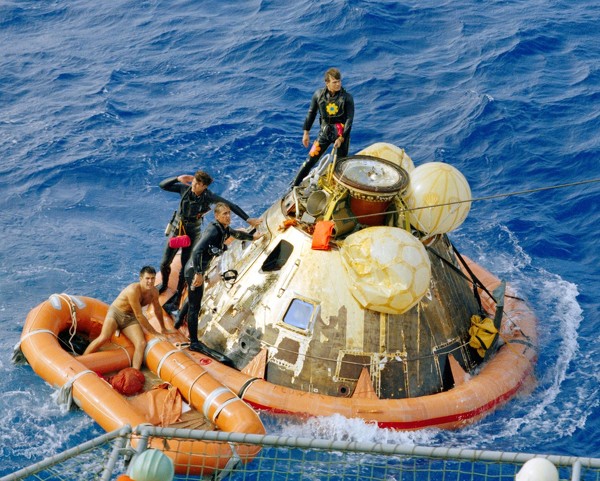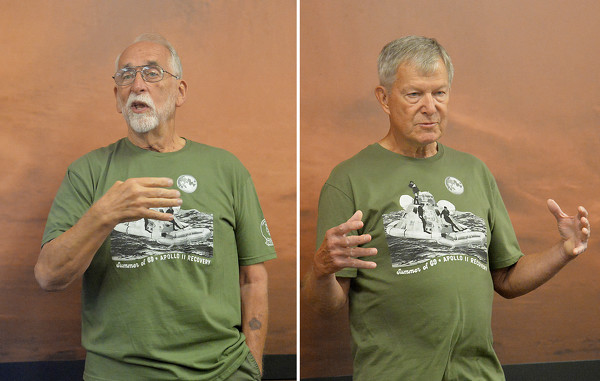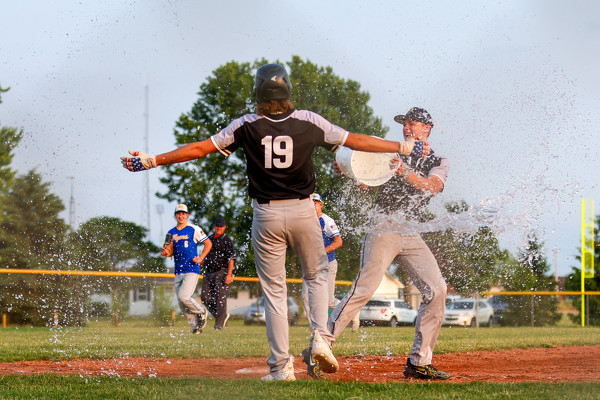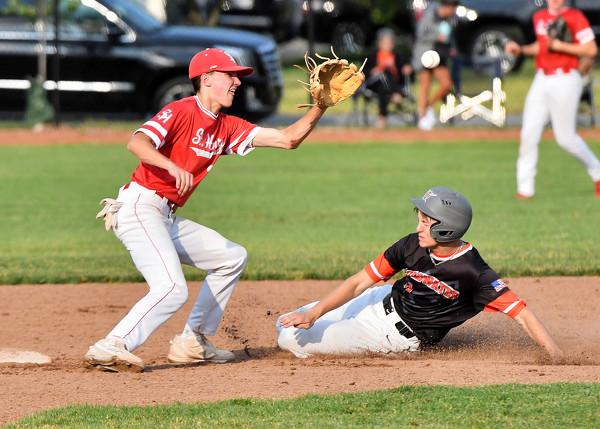
Navy frogmen stabilize the Apollo 11 command module after the astronauts had been helicoptered to the USS Hornet on July 24, 1969. NASA
WAPAKONETA - Two of the four Navy frogmen responsible for retrieving the Apollo 11 astronauts and command module Columbia from the shark-filled waters of the Pacific Ocean paid a visit to the Armstrong Air & Space Museum on Wednesday.
Speaking to a packed room of space enthusiasts, Mike Mallory and Wes Chesser shared their experiences recovering Neil Armstrong, Michael Collins and Edwin "Buzz" Aldrin on July 24, 1969, upon their return to Earth from the moon. Mallory and Chesser also worked together on the Apollo 10 recovery.
"We came back from Vietnam and the skipper says, 'You guys want to pick up the astronauts?'" Mallory recalled. "I said, 'It's going to be like a holiday compared to Vietnam, and it was really cool to be part of the first man on the moon."
The frogmen had to push their physical limits and endure grueling conditions. For instance, they were required to dive 30 feet underwater and rig an obstacle with explosives and detonating cords.
"We were trained for war," added Chesser, who also took part in the Apollo 6 recovery. "The reason we were asked to do this was because we were strong swimmers and we were strong and we were in good shape, and I think we were the logical choice to do these missions."

Frogmen Mike Mallory, left, and Wes Chesser, recall recovery missions during Apollo 10 and Apollo 11.
While others involved in the Apollo 11 mission had titles such as engineer and electronic expert, the four frogmen were the "shark bait," Mallory said.
Things did not go as swingingly on July 24, 1969, as they had for the Apollo 10 mission when the spacecraft splashed down right on site as planned on a beautiful day, Chesser said. It wast the "roughest sea state of any recovery NASA had," Mallory noted.
The Apollo 11 splashdown site was relocated to where officials had hoped the weather would be better.
"The ship (USS Hornet) had to really move through the night to get to the new splashdown point," Chesser said. "But you adapt, and we were in helicopters flying towards splashdown and, as you know, this story has a happy ending. We made it there and we did what we had to do."
Mallory evoked the wonder of seeing the Apollo 11 spacecraft crash through Earth's atmosphere at over 20,000 mph.
"We were right there like catchers at a baseball game," he said. "It came right into us like a fireball. It was really exciting. In fact, we were in the crew compartment and the helicopter guy turned it sideways so we could look out the rear door and see it coming,"
The four frogmen wearing wetsuits and flippers jumped from the helicopter into the water.
Frogman John Wolfram attached a sea anchor - "a great big parachute with an extra big hole in it"- to the capsule, Mallory said.
"Because this capsule sails like a little sail boat out there. It just takes off, especially with the wind from the helicopters," he said.
"You don't want that spacecraft to get away from you, because if it does you're not going to catch up to it," Chesser said.
Wolfram looked in the capsule window and saw the astronauts giving the thumbs-up.
"The thumbs-up was for our medic in the helicopter. If there was something wrong, if they needed help immediately, we could go from there. But thumbs-up meant, 'keep going guys, you're doing great,'" Mallory explained.
The capsule was also stabilized with a flotation collar.
"Because (the ocean's) 4,000 feet deep and we don't want that capsule sinking," Mallory said.
Chesser noted the flotation device came about in the aftermath of a Project Mercury spacecraft that sank into the ocean, losing much pivotal technology, equipment and scientific information.
Frogman Clancy Hatleberg, wearing a decontamination outfit, opened the hatch of the capsule and tossed biological isolation garments to the astronauts. NASA at the time was concerned about possible moon germs.
The astronauts put the garments on and moved to an inflatable raft where Hatleberg decontaminated them with betadine.
"He's in there scrubbing them like crazy. All the moon germs are just falling into the bottom of the raft," Chesser said.
The raft was later slashed with a knife and sank to the bottom of the ocean, along with the moon germs.
"So in a few years we're going to have Moonzilla," Mallory quipped.
The astronauts were brought up into the helicopter by way of Billy Pugh rescue nets.
"As they lift the astronaut up, he could fall out of that net," Mallory said. "So we stayed right underneath. In case he fell down, we could get him back."
The astronauts were then taken to the USS Hornet and placed into quarantine. President Richard Nixon addressed the astronauts from outside their containment unit.
"For us, that was just a big interruption," Chesser said, adding the frogmen had to wait atop the capsule until Nixon left the ship before being being picked up.
Chesser and Mallory said their experience with the astronauts was very limited to prevent the spread of possible moon pathogens. That wasn't the case with Apollo 10 when the astronauts traveled around the moon and back without actually leaving the spaceship.
"We opened the door and they looked like a bunch of squirrels in a knothole, yelling and screaming," Mallory said of the Apollo 10 astronauts. "They were excited because they'd just had seven or eight minutes of barbecue they came through and it was something else. The capsule was still warm to the touch."
Mallory also said that during the Apollo 11 recovery he took as a souvenir some of the gold foil protecting the space craft from radiation. He's given away some of the foil to obsessive space enthusiasts.
The four frogmen didn't reunite after the Apollo 11 recovery until 52 years later in July 2021 in Wapakoneta.
"We grew up in foxholes, basically," Mallory said. "We were under stress as special services and you really get to know that guy, closer than you'll know your wife or best dog or anything, and it was amazing to get together again."

